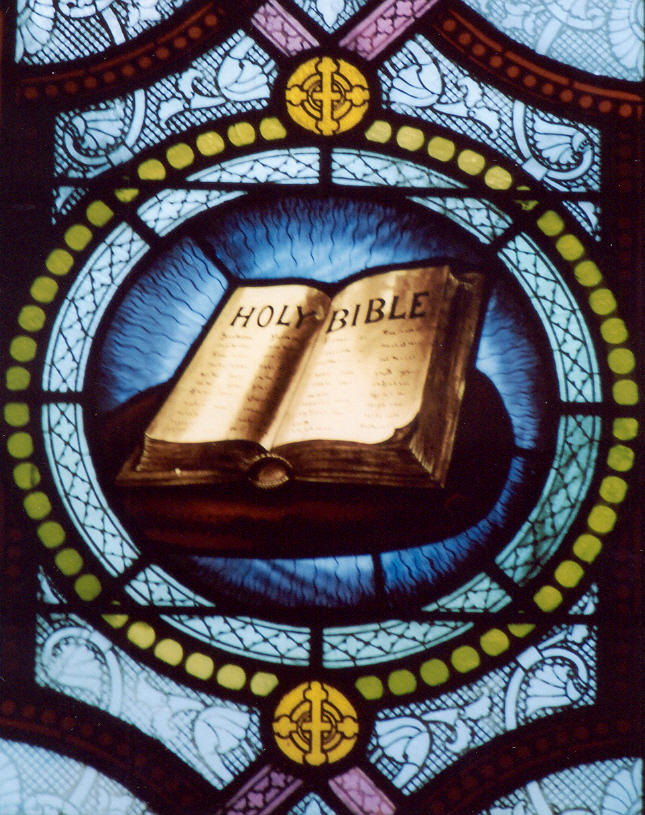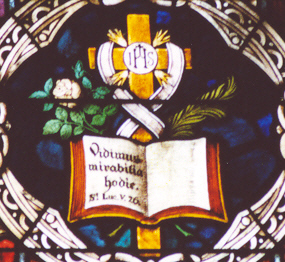
Return to
Index The Catholic Faith
Return to
Level Three Topic Index
Home Page
We know that by using our reasoning powers, we are able to know that God exists. But we also know that human reason alone cannot discover all that there is to know about our Creator. Moved by his great love for us, God has revealed himself to us first through the Jewish people of the Old Testament, and later in the life of Jesus handed on to us in the teachings of the Church. We call these truths which God has made known to us divine revelation.
History of Divine Revelation
God did not simply reveal himself to one person at one point of time; he made himself known bit by bit. The first people to know him were Adam and Eve. later God formed a chosen people, called the Israelites or Jews, to be the special keepers of his revelation.
He began forming this community by choosing a man named Abraham, who lived almost four thousand years ago in the land of Mesopotamia. God made him the father, or founder, of the chosen people. These people eventually wrote down the revelation they had received from God, writing a collection of books which we call the Old Testament.
Almost two thousand years after Abraham the time came for God to give us his greatest revelation, the gift of his only Son, Jesus Christ. Our Lord taught the people all about God and corrected some wrong ideas they had about him. In order to make sure that his teachings would be correctly understood and passed on to others, he founded the Church. Jesus made his Twelve Apostles the official teachers in the Church and placed his revelation (gospel) in their safekeeping. After the Resurrection, the apostles taught the gospel to others both by preaching and by writing (the New Testament). Some Christians today do not believe that Tradition and Scripture are both necessary for true believers to learn the whole truth about God. But the Second Vatican Council reminded us that: Tradition and the Bible . . . join together and aim at the same goal. The Bible is the message of God put in writing under the inspiration of the Holy Spirit. Tradition delivers the Word of God which was entrusted by Christ and the Holy Spirit to the apostles and their successors . . . So both Tradition and the Bible are to be accepted in the same way (Dei verbum, II, 9).

It is very important to remember that divine revelation reached its greatest point with the life of Christ and the preaching of his Twelve Apostles. The Lord's teachings, faithfully preached by these holy men, are summed up in a profession of faith that we call the Apostles' Creed. This Creed is a statement of our basic beliefs as Catholic Christians; in it are found the main mysteries of our faith. A mystery is a truth that is above our power to understand, but which we believe because God has said that it is so.
When the last surviving apostle died (Saint John, c. 100 A.D.) God's public revelation of himself to the world came to an end. All that God wanted man to know for salvation had been made known by Jesus and his Twelve Apostles, and, as Vatican II stated, "There is to be no further public revelation until Christ comes again" (Dei verbum, 1, 4).
The Holy Bible
The Holy Bible, also called Sacred Scripture, is the inspired Word of God; it is one of his greatest gifts to us. We usually think of the Bible as one book, but it is really a collection of seventy-three books, written by various men in different centuries. It is divided into two sections: the Old Testament and the New Testament.
The Old Testament
The first section of the Bible, the Old Testament, was put together by the Jewish people. It consists of the first forty-six books of the Bible which are chiefly concerned with preparing the world for the Messiah. There are three basic categories of Old Testament writings:
The Historical Books: the religious and historical traditions of the Jews. These books include the Pentateuch (the first five books of the Bible, called by the Jews the Torah or Law of Moses).
The Wisdom Books: a collection of prayers, wise sayings, and advice, often written in poetic forms.
The Prophetic Books: the words and messages of God's chosen spokesmen, the prophets. This category also includes the books of Lamentations and Baruch.
The New Testament
The second section of the Bible, the New Testament, is the most important part of the Scriptures, for it contains the life and teachings of Jesus and his Twelve Apostles. It too has different kinds of writings:
The Gospels: These are the four accounts of Christ's life and message of salvation, written by the apostles Matthew and John, and the disciples Mark and Luke. They faithfully hand on to us what Jesus said and did when he lived on earth.
The Acts of the Apostles: This is a brief history of the early Church, primarily covering the ministry of Saint Peter and the missionary work of Saint Paul.
The Letters to all Christians: These were written by various apostles as catholic, or universal, teachings to all the believers.
The Book of Revelation: Also called the Apocalypse, this book was written by the Apostle John shortly before his death. It was meant to be a source of encouragement to the persecuted Church, reminding the believers that Jesus is victorious over all his enemies.
Authorship and Inspiration of the Bible

We call the Scriptures the Word of God because their primary author was God the Holy Spirit. He chose certain men to be the human authors; they put down, in their own language and style, only what the Spirit inspired them to write. Inspiration means that God moved these men to write about him and he guided their minds as to what to put down.
Because God inspired men to write these books, they are free from all error in teaching us about God and what is necessary for our salvation. It is important to remember that the Bible is meant to teach us religious truths, not necessarily the laws of science. For example, the ancient writers thought that the earth was at the center of the universe and that the sun and stars revolved around the earth. This mistaken view of science, however, has no effect on the truths which they wrote down about God and our responsibilities toward him and to each other.
The Protector and Teach of Divine Revelation
Since God has given us his revelation through various people and in various forms, it makes sense that he would appoint someone to be the one true protector and teacher of these truths. After all, we are not dealing here with ordinary facts of life, but with the supernatural truths by which people are saved! Christ established his Church for this very purpose. He placed the Church in the hands of the apostles and their successors, saying: Full authority has been given to me. . . Go, therefore, and make disciples of all nations. . . teach them to carry out all that I have commanded you. And know that I am with you always, even until the end of the world (Mt 28:18-20).
The successors of the apostles today are the Pope (who takes Saint Peter's place of authority) and the Catholic bishops of the world. Their teaching authority is called the magisterium or official teaching office of the Church. It belongs to them alone (or to the Pope himself) to tell us what is true Christian belief. The magisterium guides the members of the Church of Our Lord in what must be believed and done by his faithful followers. Like the Twelve, the Pope and the bishops in union with him are guided by the Holy Spirit, are kept free from any errors in passing on the faith, and are the only official protectors of revelation in the world. This special gift, of being able to teach without error on matters of faith and morals, is called infallibility. With Jesus' authority and power, the Pope and bishops proclaim his Good News of salvation and show us how to live good Christian lives as we journey to Heaven, our eternal home.
Used with the permission of The Ignatius Press 800-799-5534
Return to
Index The Catholic Faith
Return to
Level Three Topic Index
Top
Home Page